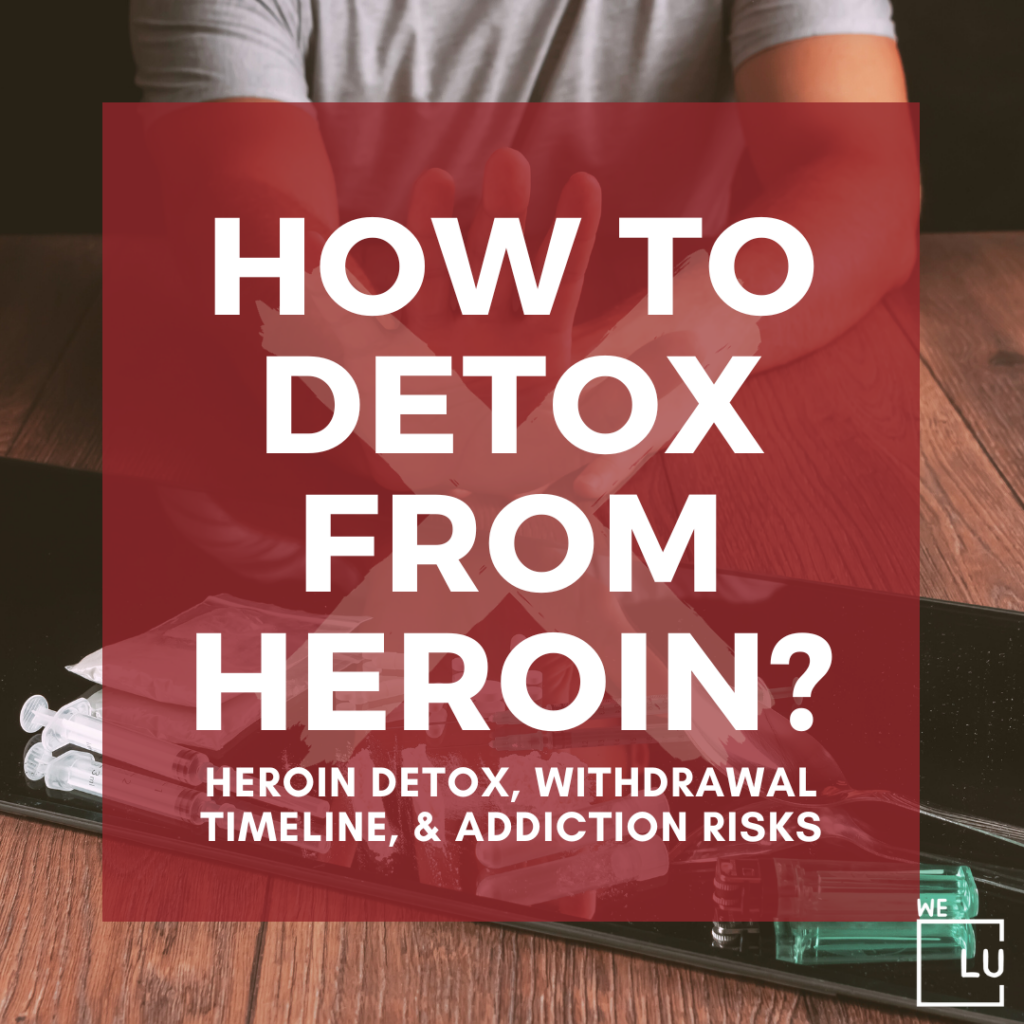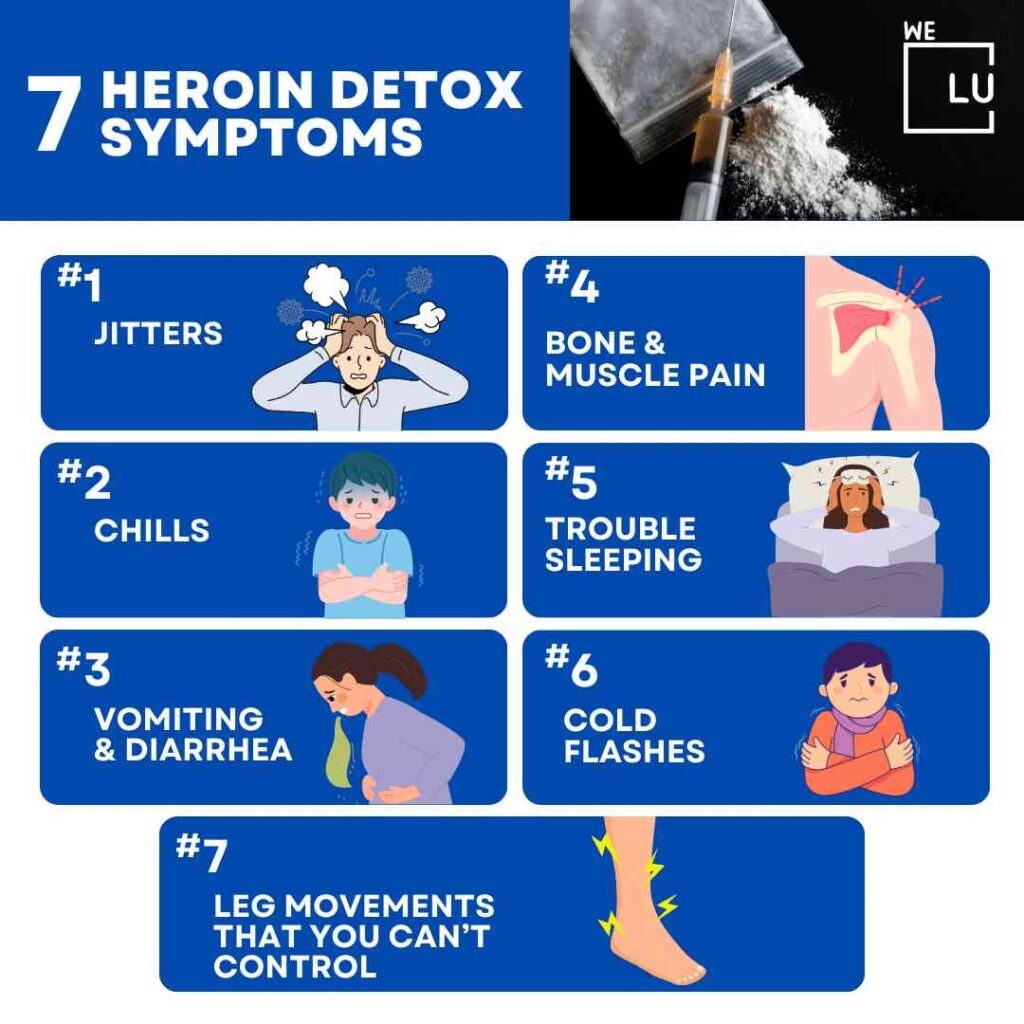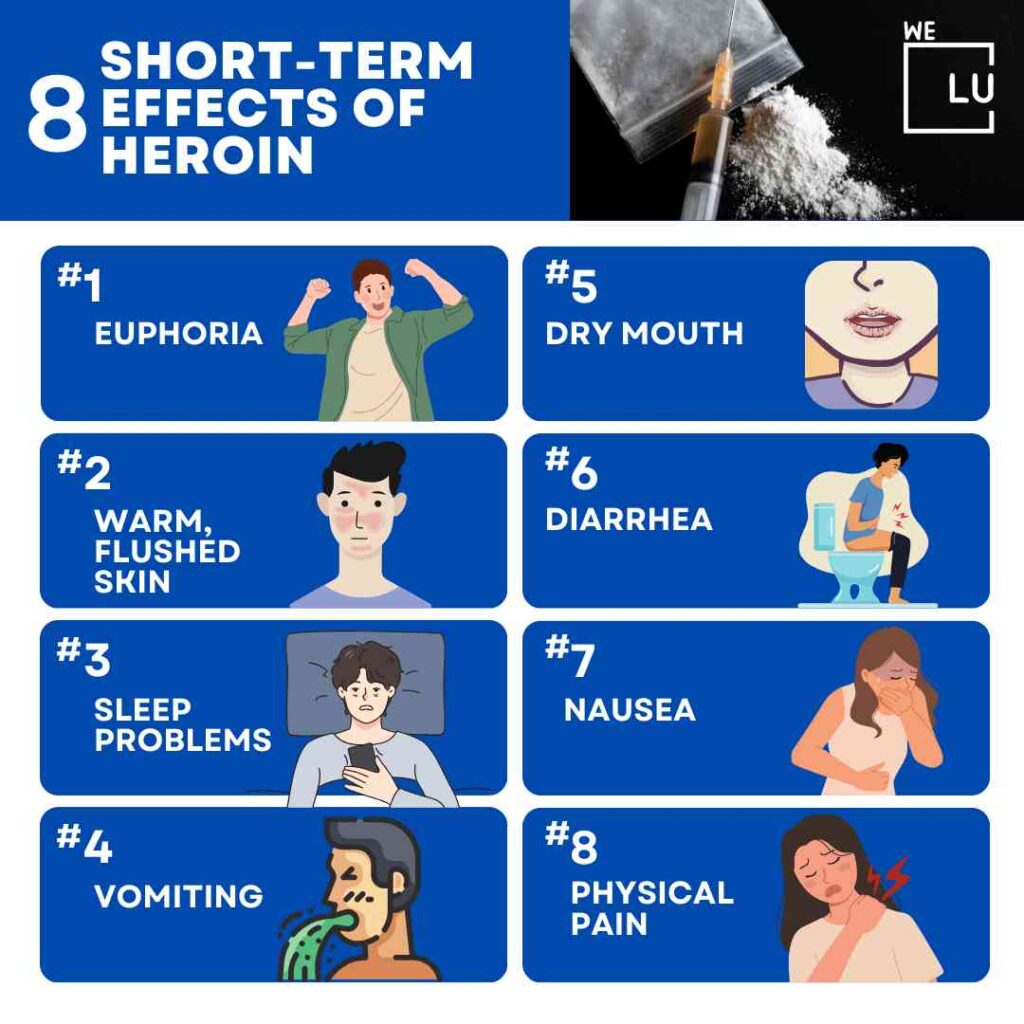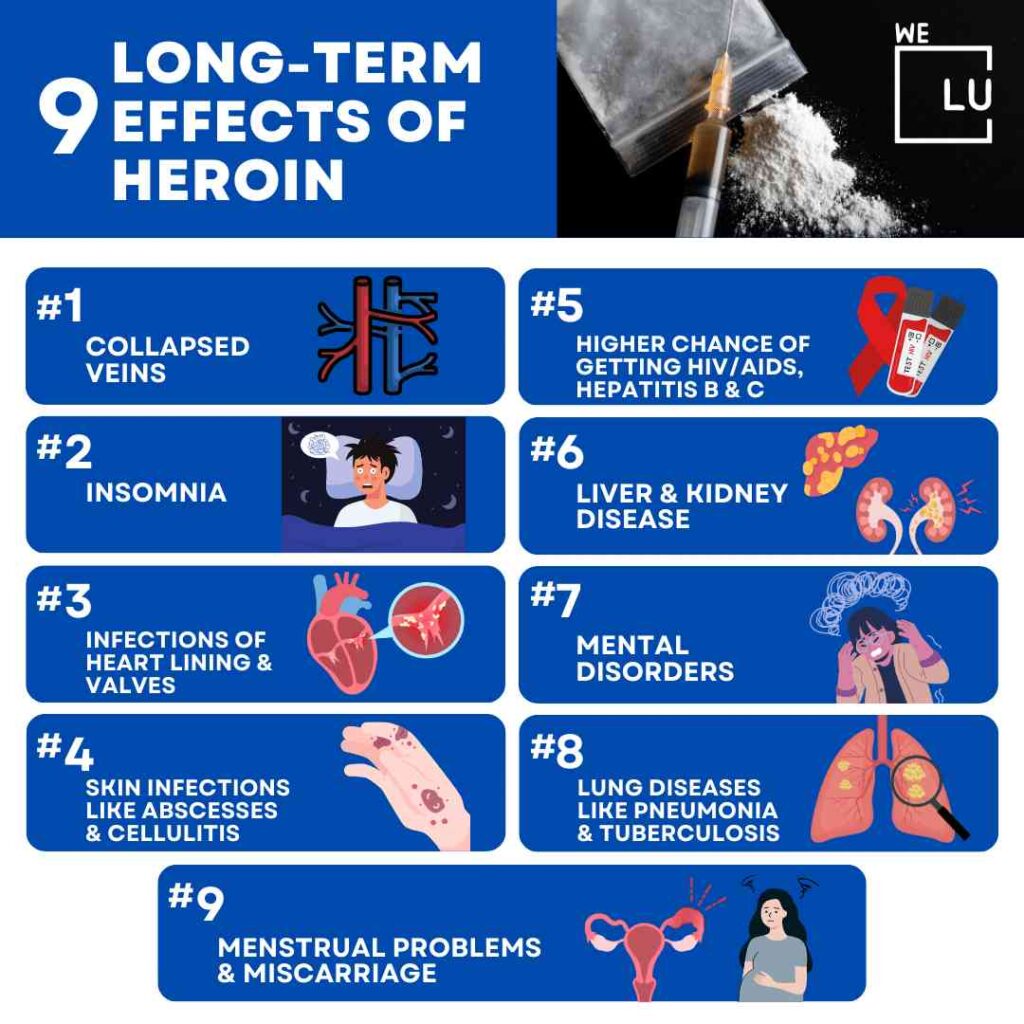How To Detox From Heroin?
Heroin is very addictive. Many people who take it develop a use disorder. This means it causes health problems, disabilities, and trouble at home, work, or school. As a highly addictive drug, heroin often requires detox in the first steps of addiction treatment for heroin. That’s because of how much damage this drug does to a person’s brain chemistry and function. Heroin detox can seem overwhelming, but it can also be one of the best steps you take towards healing.
Heroin is a drug that comes from a flower, the opium poppy, which usually grows in Mexico, Asia, and South America. It’s very addictive and has been illegal in the United States since 1924. What does heroin look like? It can look like a white or brown powder, a sticky black “tar.” It’s also called horse, smack, junk, and brown sugar.
Many people smoke or snort heroin. Most users inject it into their veins. That’s the most dangerous way to take it because it’s easier to overdose and you can catch a disease from a dirty needle.
No matter how you take it, heroin gets to your brain quickly. It’s also easy to get addicted. Even after you use it just one or two times, it can be hard to stop yourself from using it again. Learn more about why heroin is so addictive and the benefits of medically assisted heroin detox.

Right after you take heroin, you get a rush of good feelings and happiness. Then, for several hours, you feel as if the world has slowed down. You think slowly and may walk slowly. Some users say you feel like you’re in a dream.
Heroin blocks your body from getting pain messages and slows your heart rate and breathing. If experience heroin overdose, you may stop breathing and die.
Short-term effects of heroin include:
- Euphoria
- A dry mouth
- Warm, flushed skin
- Arms and legs that feel heavy
- Upset stomach and vomiting
- Itching
- A fuzzy brain
- Switching in and out of drowsiness (this is often called being “on the nod”)
Long-term heroin use can lead to:
- Collapsed veins
- Insomnia
- Infections of your heart lining and valves
- Skin infections like abscesses and cellulitis
- A higher chance of getting HIV/AIDS, hepatitis B, and hepatitis C
- Liver and kidney disease
- Mental disorders
- Lung diseases like pneumonia and tuberculosis
- Menstrual problems and miscarriage
Heroin Detox Symptoms
If you use heroin a lot, your body builds up a tolerance to it. But that doesn’t mean it won’t harm you. It means you need to take more and more to get the same high. Your body comes to depend on it. Then, when you quit using it, you have withdrawal symptoms that may include:
- Jitters
- Chills
- Vomiting and diarrhea
- Bone and muscle pain
- Trouble sleeping
- Cold flashes
- Leg movements that you can’t control
How To Detox From Heroin At Home
Many people who abuse these painkillers become dependent on them. Some even move on to abusing illegal narcotics, such as heroin.
If you stop using opiates after becoming dependent, you’ll likely experience extremely uncomfortable symptoms of withdrawal. In fact, many people continue abusing drugs to avoid the difficult symptoms that come with detoxification.

If you try to go through withdrawal on your own, you’ll need to be prepared. Try to slowly taper off opiates before you go off them completely. This might limit the intensity of your withdrawal. However, given the compulsive nature of addiction, most people find self-regulated tapering to be impossible. It often leads to a full relapse into addiction.
Dehydration due to vomiting and diarrhea is common and could lead to serious health complications. Many people end up in the hospital with dehydration when they’re going through withdrawal. Drinking plenty of hydrating fluids during withdrawal is very important. Electrolyte solutions, such as Pedialyte, may help keep you hydrated.
It can be dangerous to go through withdrawal alone. Seek help from your doctor or other medical professionals. They can even prescribe you medications to help ease the symptoms you may experience and make the withdrawal period easier to manage.
Heroin detox facilities can monitor your health and make the process safe and more effective. A care facility can provide a personalized treatment plan. Medical professionals provide important monitoring and can treat you if you have extreme side effects or if you experience dangerous complications. A facility will also work to ensure that your recovery lasts.
A detox facility can provide medications to help ease the withdrawal process. You may find that medications like clonidine can diminish some of your symptoms. Librium is sometimes used to diminish significant agitation.
How Long Does Heroin Withdrawal Last?
Repeated administration of high doses of heroin results in the induction of physical dependence. Physical dependence refers to an altered physiological state produced by chronic administration of heroin which necessitates the continued administration of the drug to prevent the appearance of a characteristic syndrome, the opioid withdrawal or abstinence syndrome.
Withdrawal symptoms may occur within a few hours after the last administration of heroin. Symptoms of the withdrawal include restlessness, insomnia, drug craving, diarrhea, muscle and bone pain, cold flashes with goosebumps, and leg movements. Major withdrawal symptoms peak between 48 and 72 hours after the last dose of heroin and subside after about a week. At this time, weakness and depression are pronounced and nausea and vomiting are common. Nevertheless, some chronic addicts have shown persistent withdrawal signs for many months or even years. [1]
Heroin Withdrawal Deaths
It is generally thought that opiate withdrawal is unpleasant but not life-threatening, but death can, and does, occur. The complications of withdrawal are often underestimated and monitored inadequately.
The opioid withdrawal syndrome is often characterized as a flu-like illness, subjectively severe but objectively mild. Signs and symptoms include dysphoria, insomnia, pupillary dilation, piloerection, yawning, muscle aches, lacrimation, rhinorrhea, nausea, fever, sweating, vomiting, and diarrhea.
How could someone die during opiate withdrawal? The answer lies in the final two clinical signs presented above, vomiting and diarrhea. Persistent vomiting and diarrhea may result, if untreated, in dehydration, hypernatraemia (elevated blood sodium level), and resultant heart failure.
When Does Heroin Withdrawal Start?
The initial comedown of heroin detox withdrawal can vary in time and intensity. Typically, withdrawal symptoms will begin 6 to 12 hours after the last dose, peaking within 1 to 3 days, and gradually subsiding over 5 to 7 days. However, some users experience weeks or months of withdrawal symptoms, known as post-acute withdrawal syndrome (PAWS). [2]

Heroin Detox
The infographic below provides information about heroin, a highly addictive drug derived from the opium poppy flower, typically found in Mexico, Asia, and South America. Heroin has been illegal in the United States since 1924. It can appear as a white or brown powder or a sticky black “tar,” and is known by various street names such as horse, smack, junk, and brown sugar.

Embed the above “7 Heroin Detox Symptoms” Infographic to your Website. This infographic is provided by the We Level Up Addiction Treatment Center team. To use the above infographics, you agree to link back and attribute its source and owner at https://weleveluptx.com/heroin-detox/
7 Heroin Detox Symptoms image link: https://weleveluptx.com/wp-content/uploads/2024/02/7-Heroin-Detox-Symptoms-Heroin-Detox-How-To-Detox-From-Heroin-Heroin-Detox-Symptoms-Heroin-Detox-Medication-1024×1024.jpg

Embed the above “8 Short-Term Effects of Heroin” Infographic to your Website. This infographic is provided by the We Level Up Addiction Treatment Center team. To use the above infographics, you agree to link back and attribute its source and owner at https://weleveluptx.com/heroin-detox/
8 Short-Term Effects of Heroin image link: https://weleveluptx.com/wp-content/uploads/2024/02/8-Short-Term-Effects-of-Heroin-Heroin-Detox-How-To-Detox-From-Heroin-Heroin-Detox-Symptoms-Heroin-Detox-Medication-1024×1024.jpg

Embed the above “9 Long-Term Effects of Heroin” Infographic to your Website. This infographic is provided by the We Level Up Addiction Treatment Center team. To use the above infographics, you agree to link back and attribute its source and owner at https://weleveluptx.com/heroin-detox/
9 Long-Term Effects of Heroin image link: https://weleveluptx.com/wp-content/uploads/2024/02/9-Long-Term-Effects-of-Heroin-Heroin-Detox-How-To-Detox-From-Heroin-Heroin-Detox-Symptoms-Heroin-Detox-Medication-1024×1024.jpg
Treatment For Heroin Addiction
Your medical team can help you find the treatment plan that works best for you. It will probably include medication and behavioral therapy. Experts say this medication-assisted treatment (MAT) is the “gold standard” of care for people who have a heroin addiction.
Medications can make it easier to wean your body off heroin and reduce cravings. Buprenorphine and methadone work in a similar way to heroin, binding to cells in your brain called opioid receptors. These medicines are safer and longer-lasting than heroin. Naltrexone blocks those receptors so opioids like heroin don’t have any effect. This makes using them less enjoyable. [3]
Cognitive-behavioral therapy helps you pay attention to the things you think and do when it comes to drug use. It gives you ways to better cope with stress and other triggers. Another type of therapy called contingency management offers rewards such as vouchers or money if you can stay drug-free.
Heroin Detox Medication
A range of treatments including medicines and behavioral therapies are effective in helping people stop heroin use. It’s important to match the best treatment approach to meet the particular needs of each individual patient.
There are medicines being developed to help with the withdrawal process. The FDA approved lofexidine, a non-opioid medicine designed to reduce opioid withdrawal symptoms.
Medications to help people stop using heroin include buprenorphine and methadone. They work by binding to the same opioid receptors in the brain as heroin, but more weakly, reducing cravings and withdrawal symptoms.
Another treatment is naltrexone, which blocks opioid receptors and prevents opioid drugs from having an effect.
A NIDA study found that once treatment is initiated, both a buprenorphine/naloxone combination and an extended-release naltrexone formulation are similarly effective in addiction.
Because full heroin detox is necessary for treatment with naloxone, initiating treatment among active users was difficult, but once heroin detox was complete, both medications had similar effectiveness. [4]
Behavioral therapies for heroin addiction include methods called cognitive-behavioral therapy and contingency management. Cognitive-behavioral therapy helps modify the patient’s drug-use expectations and behaviors and helps effectively manage triggers and stress. Contingency management provides motivational incentives, such as vouchers or small cash rewards for positive behaviors such as staying drug-free.

Opiate withdrawal can be a frustrating process with symptoms that, while typically not life-threatening, are difficult to manage. We Level Up TX Treatment Center for addiction can help you to manage the symptoms and you may experience personalized recommendations and prescription medications to ease the process. Contact us today for admission to heroin detox and speak with one of our addiction counselors. Your call is confidential and seeking help is the first step to having a commitment to getting a life drug-free.
Sources:
[1] Heroin Addiction – National Center for Biotechnology Information
[2] How Long Does Withdrawal From Heroin Last? – https://www.verywellmind.com/what-to-expect-from-heroin-withdrawal-22049
[3] Heroin – https://www.webmd.com/mental-health/addiction/heroin-use
[4] Heroin DrugFacts – National Institute on Drug Abuse